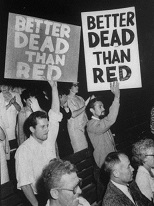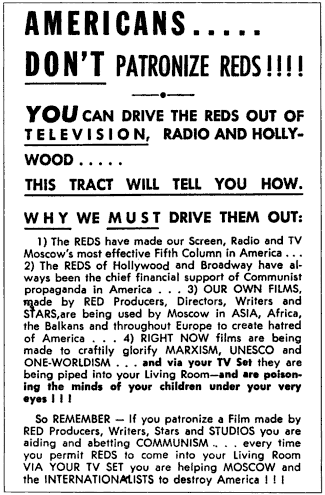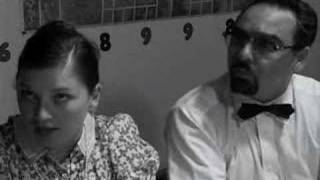
Starting in the late 1940s, fear of Communism dominated the lives of Americans. The Soviet Union was swallowing up countries in Europe, and our fear was that the American way of life was being subverted by a secret Communist plot the originated in Moscow.
Dozens of people particularly from the entertainment industry were hauled before the Congressional House Un-American Activites Committee and were subsequently blacklisted from their chosen profession. Senator Joe McCarthy crusaded against Communists or anyone who associated with Communists, ruining 100s of lives until the Senate finally censured him in 1954.
Was the blacklisting justified? Or was it a trampling on the very freedoms that we sought to protect?
In the late 1940s World War II was over and our country emerged stronger than ever. Unfortunately with the end of one war came the beginning of another called the Cold War. The Soviet Union also emerged from World War II stronger and they took their strength and swallowed up other countries. Lots of them. Before long they had the atomic bomb, and the world was launched into a frightening period of fear. We feared nuclear war. We feared Communism. We feared the Soviet Union would swallow us up and impose their totalitarian ways on us.
America's response to the Soviet Union and the Cold War was to root out Communism. Wherever it was. And in many cases where it wasn't! If you'd ever been a member of the Communist Party, or ever been to a Communist Party meeting, or ever known someone who'd been to a Communist Party meeting - you were at risk of being blacklisted. Blacklisting often meant you'd lose your job, lose your friends, and pretty much lose the ability to work in your chosen profession. Politicians fell over each other to be more anti-Communist than the next guy.
Congress formed the House Un-American Activities Committee, or HUAC which was in charge of bringing suspected Communists particularly from the entertainment industry. Joseph McCarthy, the junior Senator from Wisconsin, held his own hearings in the Senate in which he accused government officials of being Communist. Both the HUAC and McCarthy campaigns went on during the same time period and they used the same tactics -
- haul people before the committee
- ask them questions like "are you or have you ever been a member of the Communist party?"
- ask them for the names of other people who are associated with the Communist party
- cite them with contempt if they refuse to answer
If they refused to answer or refused to incriminate others, they'd be effectively blacklisted from whatever their chosen profession was. They were essentially convicted of the crime of being associated with Communism (which is not really a crime).
The most well-known cases of blacklisting happened with the entertainment industry. The HUAC first brought people in the Hollywood film industry to testify in 1947. The fear was that people making the films were secretly inserting Marxist subversive messages into the films, so they wanted to expose anyone in Hollywood who had any sorts of ties to the Communist party. 10 of the witnesses refused to answer questions such as "Are you or have you ever been a member of the Communist party?" These 10 would become known as the Hollywood Ten. Congress voted to cite these 10 with contempt of Congress, and the following day film executives declared that these 10 would be fired and would never work again until they had sworn they were not Communists. Thus the Hollywood blacklist began.
Over the coming years, scores of workers in the entertainment industry were blacklisted based on their suspected involvement with the Communist party. If your name was on the list of suspects, you couldn't work. The HUAC presented people with a choice of informing on their colleagues or being cited with contempt. In actor Larry Parks' testimony he pleaded with the committee
Don't present me with the choice of either being in contempt of this committee and going to jail or forcing me to really crawl through the mud to be an informer. For what purpose? I don't think it is a choice at all. I don't think this is really sportsmanlike. I don't think this is American. I don't think this is American justice.
Parks eventually testified as a friendly witness and named names, but was blacklisted anyway. Many others were brought before the committee and presented with the same choice - name names or be guaranteed the blacklist treatment. Some, like Elia Kazan, willingly named names and ruined the lives of many of their colleagues. Others refused to name names, citing their 5th amendment rights. Many like Lionel Stander, made eloquent statements about how the committee was depriving them of the very rights the hearings were trying to defend.
I know of a group of fanatics who are desperately trying to undermine the Constitution of the United States by depriving artists and others of Life, Liberty, and the Pursuit of Happiness without due process of law.... I can tell names and cite instances and I am one of the first victims of it.... [This is] a group of ex-Fascists and America-Firsters and anti-Semites, people who hate everybody including Negroes, minority groups and most likely themselves.... [T]hese people are engaged in a conspiracy outside all the legal processes to undermine the very fundamental American concepts upon which our entire system of democracy exists.
Stander was making this statement about the committee itself.
The blacklisting went on for years in the 1950s. Entertainers had to choose to renounce their principles or not work. Some, like actor Philip Loeb, committed suicide after being blacklisted.
While the House Un-American Activities Committee was busy ruining the lives of hundreds of people, Joseph McCarthy rose to immediate prominence with his speech in Wheeling, West Virginia in 1950.
I have here in my hand a list of 205 that were made known to the Secretary of State as being members of the Communist Party and who nevertheless are still working and shaping policy in the State Department.
Historians dispute whether he said 205 or 57 communists. I think he just pulled out the first number that came into his head. Nevertheless, for the next 4 years McCarthy drove fear into men at all levels of government by accusing them of being communist. He hauled people in front of his committee in much the same way the HUAC did their work. Eventually, his act grew tired. In one famous hearing with Army counsel Joseph Welch, Welch was quoted:
Until this moment, Senator, I think I have never really gauged your cruelty or your recklessness.
Senator. You've done enough. Have you no sense of decency, sir? At long last, have you left no sense of decency?
The public "taking down" of McCarthy is largely credited to the work of Edward R Murrow of CBS. Murrow broadcast the weekly news program "See It Now". In the early 1950s, television was a new medium, and no one knew at the time how influential television would be. Murrow denounced McCarthy's tactics on air repeatedly, and with television's new reach he was able to show McCarthy as a reckless demagogue.
No one familiar with the history of this country, can deny that congressional committees are useful. It is necessary to investigate before legislating. But the line between investigating and persecuting is a very fine one, and the Junior Senator from Wisconsin has stepped over it repeatedly. We must not confuse dissent with disloyalty.
McCarthy was censured from the Senate in 1954 (What does that really mean? Does it mean they'll wake you if you fall asleep when the Senate is in session?) The anti-Communist witch hunts largely ended soon after, but people who were blacklisted still were blacklisted. Many of the blacklisted entertainers could not get work well into the 1960s.
Folksinger Pete Seeger testified before the committee in 1955 and refused to answer questions. For many years musical venues would not book him for concerts or any type of performances. Finally, in 1967 he was booked for the Smothers Brothers Comedy Hour. There was a lot of buildup as this would be a big coming out for Seeger after years of being blacklisted. Seeger, ever true to his principles, sang the song "Waist Deep in the Big Muddy" which many considered a direct criticism of President Johnson and the Viet Nam war. The performance was cut from the show by CBS.
The Cold War went on for years, but thankfully blacklisting and the red scare never again reached the depths that they did during the HUAC hearings and the McCarthy period.
Fun Fact: Watch the credits at the end of the film "The Front." You will see that nearly all of the actors in the movie were blacklisted and couldn't work for a lengthy period of time in the 1950s.











MAILLOT CHELSEA ENFANT
You know I love your blog!!! maillot chelsea enfant